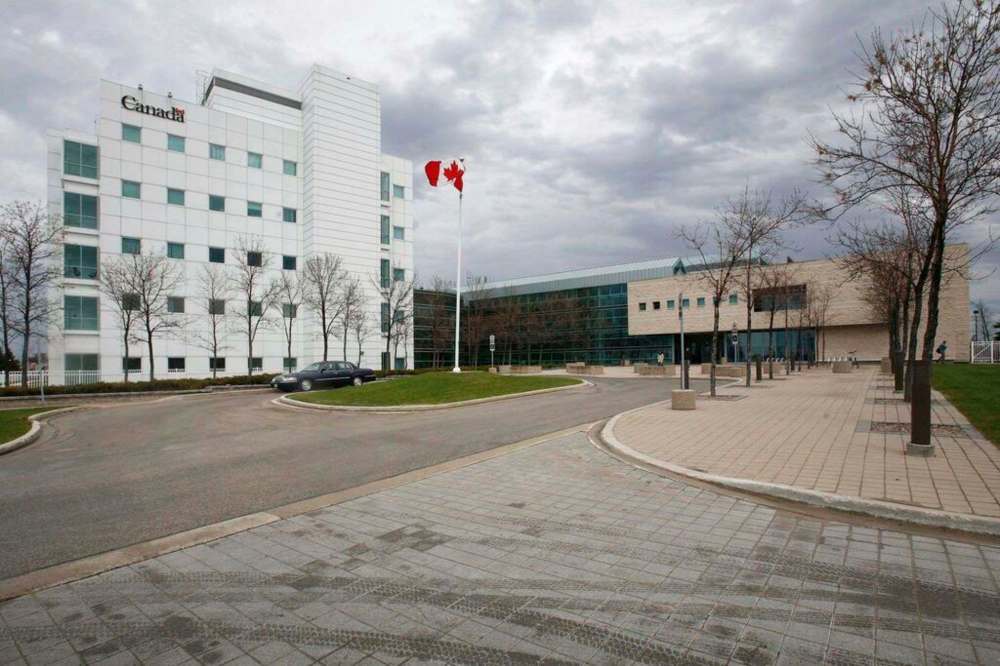Federal lab in Winnipeg tightens rules on virus shipments
Changes follow ouster of Chinese scientists
Advertisement
Read this article for free:
or
Already have an account? Log in here »
To continue reading, please subscribe:
Monthly Digital Subscription
$0 for the first 4 weeks*
- Enjoy unlimited reading on winnipegfreepress.com
- Read the E-Edition, our digital replica newspaper
- Access News Break, our award-winning app
- Play interactive puzzles
*No charge for 4 weeks then price increases to the regular rate of $19.00 plus GST every four weeks. Offer available to new and qualified returning subscribers only. Cancel any time.
Monthly Digital Subscription
$4.75/week*
- Enjoy unlimited reading on winnipegfreepress.com
- Read the E-Edition, our digital replica newspaper
- Access News Break, our award-winning app
- Play interactive puzzles
*Billed as $19 plus GST every four weeks. Cancel any time.
To continue reading, please subscribe:
Add Free Press access to your Brandon Sun subscription for only an additional
$1 for the first 4 weeks*
*Your next subscription payment will increase by $1.00 and you will be charged $16.99 plus GST for four weeks. After four weeks, your payment will increase to $23.99 plus GST every four weeks.
Read unlimited articles for free today:
or
Already have an account? Log in here »
Hey there, time traveller!
This article was published 10/06/2021 (1645 days ago), so information in it may no longer be current.
OTTAWA — The National Microbiology Laboratory in Winnipeg has bolstered the paperwork required to ship samples of viruses internationally after two Chinese scientists were removed from the lab in 2019.
The policy change is mentioned in 290 pages of redacted internal documents from the Public Health Agency of Canada, which were released to the public by a House of Commons committee Tuesday.
MPs had demanded information about a shipment of Ebola virus and Henipah virus to China in 2019, and the dismissal of researchers Xiangguo Qiu and Keding Cheng.

Ottawa insists the scientists’ removal and the shipments are not linked.
The documents show that in 2018, the Wuhan, China lab informally requested the samples through Qiu, whom Public Health had sent to Wuhan for various conferences and research tasks.
Qiu was told shipping the viruses would require a material transfer agreement, which is a formal contract that governs intellectual property protocols and safety and liability issues related to the use of samples.
Qiu told colleagues she didn’t see the point of a material transfer agreement because the samples were raw viruses, instead of the results of intellectual property.
“Most of these viruses are from outbreak isolates and technically no one owns the (intellectual property),” Qiu wrote in July 2018.
“I will check with them and try my best to push. But again, (material transfer agreement) usually takes quite a long time in our agency.”
In September 2018, the Wuhan lab issued a formal request, and the head of the Winnipeg lab immediately insisted a material transfer agreement was needed.
“I have some concerns here. No certifications are provided, they simply cite they have them,” wrote Matthew Gilmour, who was the scientific director general at the lab at the time.
“(Material transfer agreements) would be required, not generic ‘guarantees’ on their storage and usage.”
Gilmour questioned why China would ask Canada for those samples, instead of seeking them from a country closer to it.
The head of the special pathogens division, who oversaw Qiu, said that probably wasn’t possible.
“Historically, it’s also been easier to obtain material from us, as opposed to U.S. labs. I don’t think other, closer labs have the ability to ship these materials,” wrote David Safronetz.
“We would, of course, not send anything out without appropriate paperwork, (material transfer agreements and) certifications,” Safronetz said.
The federal agency signed off on shipping the sample on Oct. 25, 2018, but it wasn’t sent from Winnipeg until March 28, 2019.
Immediately after the shipment occurred, officials in Ottawa had questions.
The federal agency’s risk-assessment centre asked what samples were shipped, and why they were sent to China.
The head of biosafety and biocontainment operations separately asked Winnipeg employees for the same information.
“We didn’t do anything wrong… just that because of the nature of the pathogens and where it was going, (the higher-ups in the agency) wanted to know if we did our due diligence,” wrote a lab employee.
Qiu and Cheng were escorted from the lab by RCMP officers in July 2019.
The Free Press has reported on finger-pointing within the lab over the shipment. In an email dated July 17, 2019, a union representative demanded her colleagues attend if supervisors started questioning employees who work in the specimen shipping-and-receiving area.
“Any processes our members performed at the request of Qiu or Cheng were done as per the standard operating procedures, and with the understanding that what was received or shipped was recorded in the transport documentation,” the emails read.
“There was no requirement to examine or verify the identity of these specimens shipped or received,” she wrote, asking that the union be made aware if shipping staff are questioned about “any duplicity by Qiu or Cheng.”
Two weeks later, the Free Press reported that the samples were sent without a material transfer agreement, which the federal agency confirmed, but later said officials determined that documentation on biosafety and the transport of dangerous goods was sufficient.
Yet a March 2021 briefing binder shows the agency now requires such material transfer agreements.
“As of early 2020, for clarity to employees and safeguards for our science, (they) are required for all sharing or receiving of biological materials with other research organizations,” reads notes prepared for a parliamentary committee.
That was the result of “strengthening policies and processes that allow for appropriate scientific collaboration, while adhering to established security controls,” the note says.
The federal agency says it fired Qiu and Cheng in January 2021 over what it vaguely referred to as an “administrative matter” involving “possible policy breaches.”
However, Ottawa has recently started to say the incident involved national security.
The Globe and Mail has reported that the Canadian Security Intelligence Service urged the lab to revoke the couple’s security clearances, specifically due to the Wuhan shipment.
The government has been reluctant to discuss the matter. That’s created an information vacuum where the Wuhan shipments have been linked to unsubstantiated theories that the Chinese lab created or accidentally leaked the virus that causes COVID-19.
On Monday, the House of Commons law clerk notified Parliament the Trudeau government has refused to comply with an order to provide all uncensored records to the Speaker, so an independent officer could redact sensitive information instead of the department.
dylan.robertson@freepress.mb.ca







